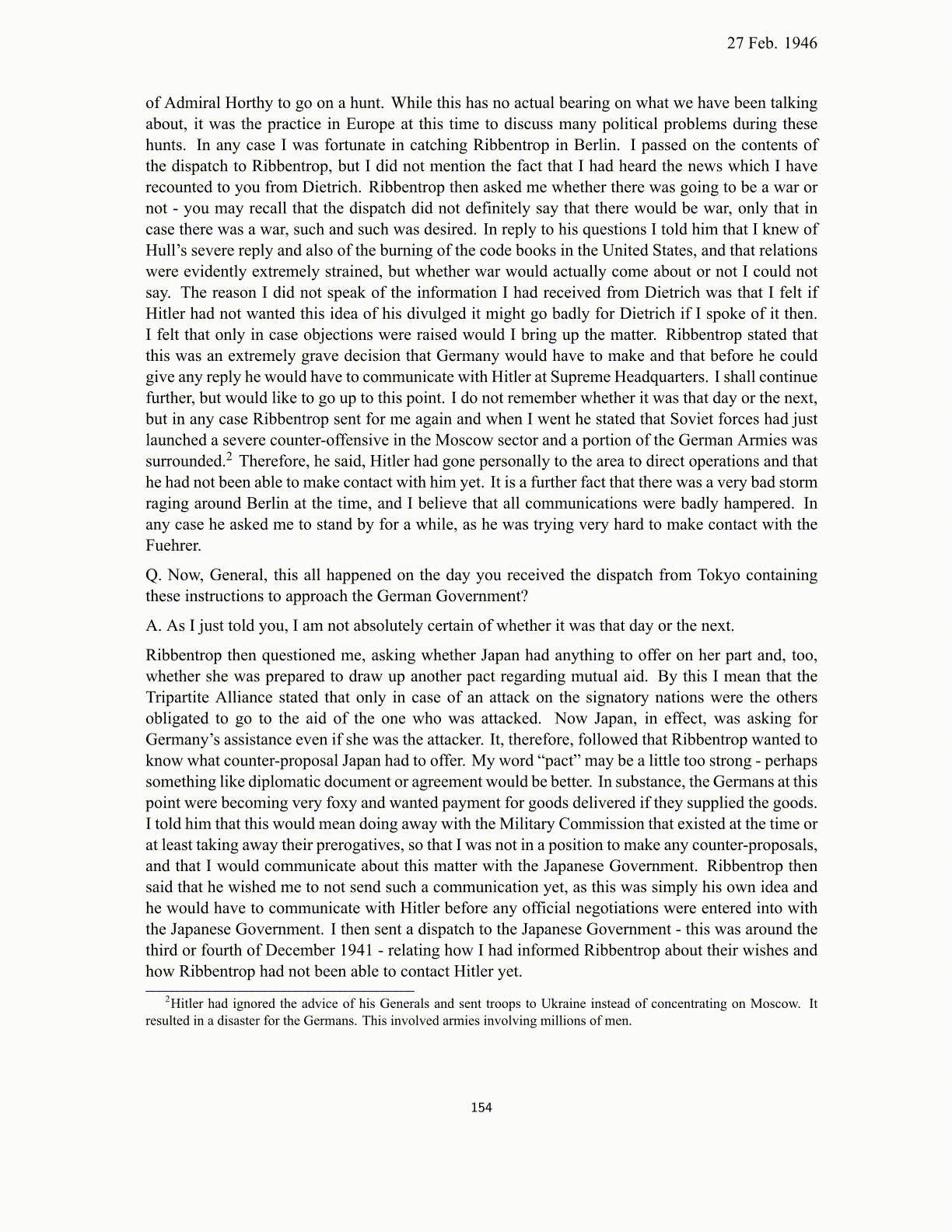
27 Feb. 1946 of Admiral Horthy to go on a hunt. While this has no actual bearing on what we have been talking about, it was the practice in Europe at this time to discuss many political problems during these hunts. In any case I was fortunate in catching Ribbentrop in Berlin. I passed on the contents of the dispatch to Ribbentrop, but I did not mention the fact that I had heard the news which I have recounted to you from Dietrich. Ribbentrop then asked me whether there was going to be a war or not - you may recall that the dispatch did not definitely say that there would be war, only that in case there was a war, such and such was desired. In reply to his questions I told him that I knew of Hull’s severe reply and also of the burning of the code books in the United States, and that relations were evidently extremely strained, but whether war would actually come about or not I could not say. The reason I did not speak of the information I had received from Dietrich was that I felt if Hitler had not wanted this idea of his divulged it might go badly for Dietrich if I spoke of it then. I felt that only in case objections were raised would I bring up the matter. Ribbentrop stated that this was an extremely grave decision that Germany would have to make and that before he could give any reply he would have to communicate with Hitler at Supreme Headquarters. I shall continue further, but would like to go up to this point. I do not remember whether it was that day or the next, but in any case Ribbentrop sent for me again and when I went he stated that Soviet forces had just launched a severe counter-offensive in the Moscow sector and a portion of the German Armies was surrounded. 2 Therefore, he said, Hitler had gone personally to the area to direct operations and that he had not been able to make contact with him yet. It is a further fact that there was a very bad storm raging around Berlin at the time, and I believe that all communications were badly hampered. In any case he asked me to stand by for a while, as he was trying very hard to make contact with the Fuehrer. Q. Now, General, this all happened on the day you received the dispatch from Tokyo containing these instructions to approach the German Government? A. As I just told you, I am not absolutely certain of whether it was that day or the next. Ribbentrop then questioned me, asking whether Japan had anything to offer on her part and, too, whether she was prepared to draw up another pact regarding mutual aid. By this I mean that the Tripartite Alliance stated that only in case of an attack on the signatory nations were the others obligated to go to the aid of the one who was attacked. Now Japan, in effect, was asking for Germany’s assistance even if she was the attacker. It, therefore, followed that Ribbentrop wanted to know what counter-proposal Japan had to offer. My word “pact” may be a little too strong - perhaps something like diplomatic document or agreement would be better. In substance, the Germans at this point were becoming very foxy and wanted payment for goods delivered if they supplied the goods. I told him that this would mean doing away with the Military Commission that existed at the time or at least taking away their prerogatives, so that I was not in a position to make any counter-proposals, and that I would communicate about this matter with the Japanese Government. Ribbentrop then said that he wished me to not send such a communication yet, as this was simply his own idea and he would have to communicate with Hitler before any official negotiations were entered into with the Japanese Government. I then sent a dispatch to the Japanese Government - this was around the third or fourth of December 1941 - relating how I had informed Ribbentrop about their wishes and how Ribbentrop had not been able to contact Hitler yet. 2 Hitler had ignored the advice of his Generals and sent troops to Ukraine instead of concentrating on Moscow. It resulted in a disaster for the Germans. This involved armies involving millions of men. 154